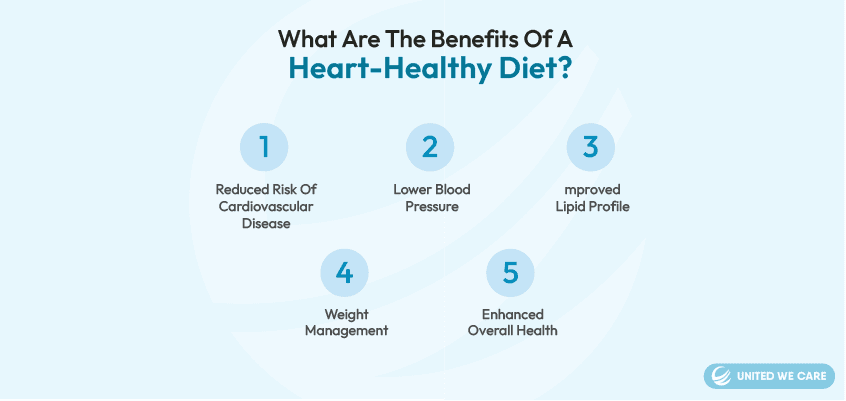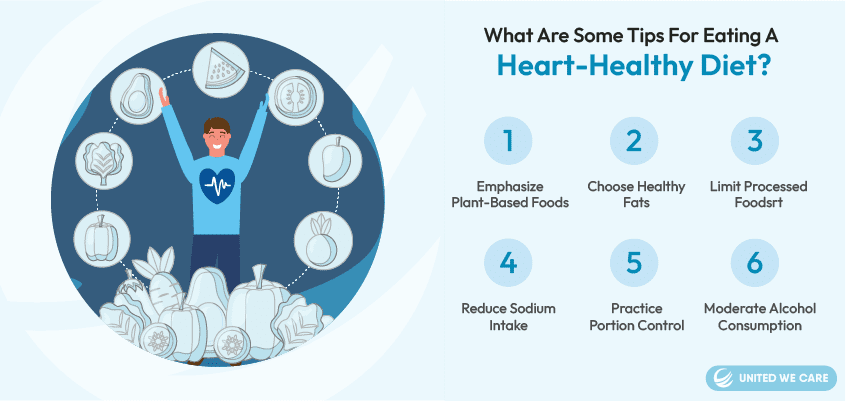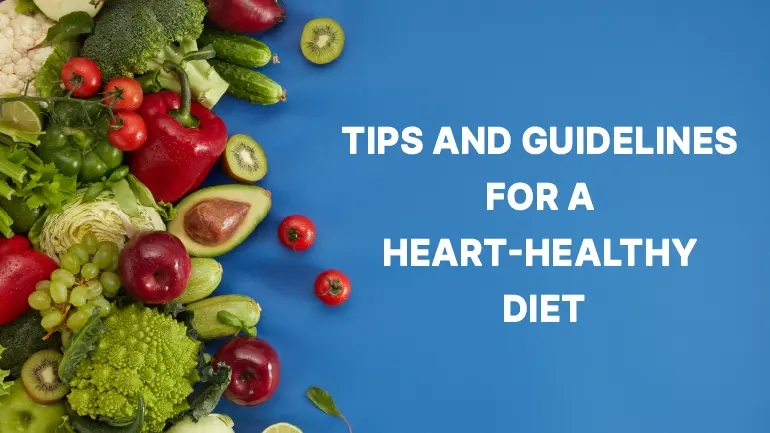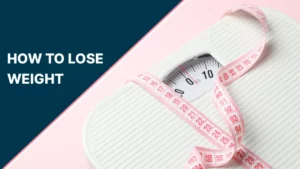Introduction
Our heart is a vital organ that sends blood to all parts of the body. But did you know there are some kinds of food that do not allow our heart to pump blood properly? Therefore, a heart-healthy diet is important. It focuses on consuming nutrient-rich foods that decrease the risk of heart disease. Let’s find out what exactly a heart-healthy diet is, how it can benefit you, and how you can add certain specific foods to your diet.
“If you knew you could change your lifestyle and diet and avoid heart disease and other things, you should do it.” -Laila Ali [1]
What Is A Heart-Healthy Diet?
I grew up in a family that was absolutely adamant about eating a balanced and healthy meal. A few cheat days were ok, but if ever one of has started eating junk food all the time, my mother would last listing how much of an impact it can have on the heart.
The reason was that she had seen a few of our family members suffer from heart disease and wanted to make sure that all of us ate healthily.
A heart-healthy diet contains foods that are good for the heart and can help avoid the risks of having heart disease and related issues. There are different types of diets that can come under a heart-healthy diet, like the Mediterranean diet [2], the DASH diet [3], etc.
The way these diets help is that they do not include foods that need frying and are high in saturated and trans fats, cholesterol, sodium, etc. Avoiding these types of foods in any case can help the heart. Rather, include home-cooked meals and grilled or baked options [4].
What Are The Benefits Of A Heart-Healthy Diet?
Our heart is the second most important organ in our body. So taking care of it is our job. So for that, eating a heart-healthy diet becomes crucial. Here’s how [5] [6]:

- Reduced Risk Of Cardiovascular Disease: The term ‘heart-healthy’ by itself shows that it can help with heart diseases and in keeping it healthy. If you follow a heart-healthy diet, then you will be successful in reducing the risks of heart attacks, strokes, failure, etc.
- Lower Blood Pressure: A heart-healthy diet helps you to add a variety of fruits, vegetables, whole grains, low-fat dairy products, etc., to your meal plans. These foods combined with low salt can help you in managing your blood pressure levels and probably eliminate hypertension altogether.
- Improved Lipid Profile: Cholesterol is a wax-like substance in your blood that helps the body to build healthy cells. But did you know there is a bad cholesterol that harms the heart and a good cholesterol that helps the heart work in a better manner? Therefore, there are certain foods also that increase bad cholesterol levels and certain foods that increase good cholesterol levels. So, eating a heart-healthy diet can help you to improve your lipid profile.
- Weight Management: When we eat healthy, automatically, we are able to manage our weight, whether we want to lose weight or increase it. By consuming a heart-healthy diet that includes nutrient-rich whole foods and limits processed and high-fat foods, you can reduce the risk of obesity. Obesity has a direct impact on the heart, so you can effectively lower the chances of heart disease as well.
- Enhanced Overall Health: Eating a heart-healthy diet works its wonders on not just the heart but other areas also. It can help you lower the risk of type 2 diabetes, arthritis, etc. In fact, you will notice that you have more energy, and you can get a lot more done when you start having a heart-healthy diet. Even your sleep will start getting better, and you can experience a sound sleep where you wake up feeling fresh.
What Are Some Tips For Eating A Heart-Healthy Diet?
It is super easy to add these foods to your diet. But, do keep the following factors in mind [7]:

- Emphasize Plant-Based Foods: You can start by eating more fruits, vegetables, whole grains, nuts, etc. These foods are rich in fiber and antioxidants, which can help the heart. You can get creative with these foods and try new recipes. In fact, now, even for meat, there are certain plant-based and vegetarian options available for you to check out.
- Choose Healthy Fats: Fats are an important component of a balanced diet. But, if you have too much of butter, cheese, red meat, palm oil, etc., then you are doing yourself more bad than good. These fats are called saturated fats because they are solid at room temperature. Instead, shift to unsaturated options like olive oil, nuts, fatty fish, avocados, etc. They are healthy and can help with the heart.
- Limit Processed Foods: Do you eat a lot of frozen or junk food? All such foods are processed food. They contain high levels of unhealthy fats, sodium, and added sugars. This includes sodas as well. Once in a while is fine, but if you eat this food every day, you are risking getting heart disease. Instead, focus on whole grains, fruits, and home-cooked fresh meals. Have normal water rather than sparkling water or soft drinks.
- Reduce Sodium Intake: Many doctors recommend you to reduce your salt levels if you have a history of heart disease in the family or have high blood pressure. So, to keep your heart healthy, make sure to reduce the salt levels in your food. You can compensate by adding certain natural herbs and spices. Every time you buy food, check the sodium content in them and then make your choice.
- Practice Portion Control: When we eat less, we tend to eat a lot in one meal. So strategize your meals and keep portions in mind. My nutritionist would always tell me to eat little every 2-3 hours. That way, I would not overeat, and I would be full all the time. By doing this, you can avoid obesity and related heart conditions.
- Moderate Alcohol Consumption: If you drink alcohol, do so in moderation. Consuming too much alcohol puts a lot of pressure on your heart because it has to work twice as hard to fight the toxins that come with alcohol. So one or two drinks before dinner once in a while is good enough. Do not go overboard.
Conclusion
The heart is the second most important organ in our body. So taking care of it is our responsibility. One of the ways to do that is by having a heart-healthy diet filled with fruits, vegetables, nuts, etc. These foods are rich in antioxidants and fiber and can help your heart pump blood better. That way, you can eliminate a lot of other related diseases in your life. Just be patient and get creative with your cooking, and you can enjoy a healthy life ahead.
If you want to start following a heart-healthy diet, contact our counseling and nutrition experts or explore more content at United We Care! At United We Care, a team of wellness and mental health experts will guide you with the best methods for well-being.
References
[1] “Quotes by ‘Laila Ali’ | What Should I Read Next?,” Quotes by “Laila Ali” | What Should I Read Next? https://www.whatshouldireadnext.com/quotes/authors/laila-ali
[2] R. Estruch et al., “Primary Prevention of Cardiovascular Disease with a Mediterranean Diet,” New England Journal of Medicine, vol. 368, no. 14, pp. 1279–1290, Apr. 2013, doi: 10.1056/nejmoa1200303.
[3] F. M. Sacks et al., “Effects on Blood Pressure of Reduced Dietary Sodium and the Dietary Approaches to Stop Hypertension (DASH) Diet,” New England Journal of Medicine, vol. 344, no. 1, pp. 3–10, Jan. 2001, doi: 10.1056/nejm200101043440101.
[4] D. Mozaffarian et al., “Heart Disease and Stroke Statistics—2016 Update,” Circulation, vol. 133, no. 4, Jan. 2016, doi: 10.1161/cir.0000000000000350.
[5] T. J. Coates, R. W. Jeffery, and L. A. Slinkard, “Heart healthy eating and exercise: introducing and maintaining changes in health behaviors.,” American Journal of Public Health, vol. 71, no. 1, pp. 15–23, Jan. 1981, doi: 10.2105/ajph.71.1.15.
[6] L. J. Appel et al., “A Clinical Trial of the Effects of Dietary Patterns on Blood Pressure,” New England Journal of Medicine, vol. 336, no. 16, pp. 1117–1124, Apr. 1997, doi: 10.1056/nejm199704173361601.
[7] L. Schwingshackl et al., “Food Groups and Risk of Hypertension: A Systematic Review and Dose-Response Meta-Analysis of Prospective Studies,” Advances in Nutrition, vol. 8, no. 6, pp. 793–803, Nov. 2017, doi: 10.3945/an.117.017178.









